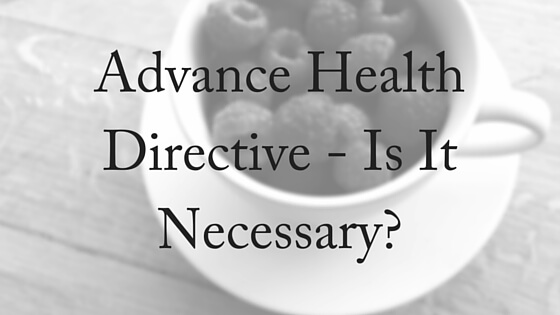
What role does an advance health directive play in modern Australian society?
Australians generally have a long life expectancy. According to the Australian Institute of Health and Welfare, most males will live until about 80 and females until about 84 years of age. Sometimes there is a drawn-out decline. Making decisions about your end-of-life wishes need to be done now. Being clear about your future healthcare plans is more important than ever before in our medically advancing world. Whether those wishes will be carried out is another story – this is where advance care directives have a part to play.
Advance health directive – what is it?
Sometimes also known as a living will, an advance health directive (or advance care directive) is a legal document that gives instructions about your future healthcare, usually when you are incapacitated and cannot make decisions yourself. The document may also nominate a family member or trusted friend to make those decisions when you can’t. They are not just for ‘old people’ as to when to turn off the life support machine, but may also be useful for younger people who have an accident or are victims of a disease.
[Tweet “Advance health directives are not just for ‘old people’.”]
Dr Annette Street, an adjunct professor of palliative care at La Trobe University, says the documents “are not just a vehicle for people to leave instructions that would lead to their death. Instead, they are directed at quality of life near the end so that undesired and unwarranted treatments are not initiated and values and religious or cultural preferences are respected”. Street says about one in four people lose the ability to make decisions about healthcare at the end of their lives.
There is no legally enforceable nationwide definition of an advance health directive. Only Western Australia, Queensland, South Australia and Victoria have specific legislation concerning advance health directives, and it only applies within the respective state. The legal question is just part of the confusion. Regardless of state statutes, medical professionals have the power to dismiss the document if they disagree with the directive.
A position statement on advance health directives provided by the Australian Medical Association says the peak body is “concerned that legally enforceable advance directives [as the AMA calls them] may lead the doctor into a situation that he or she believes does not reflect good clinical care”. The AMA maintains doctors are “under no obligation to follow an AD to which they hold a conscientious objection”.
Advance health directive – is it legally binding?
There’s understandable confusion about the legal validity of these documents, especially considering the variations from state to state. There are currently a vast array of differing advance health directive forms and it’s unclear which ones will or won’t be honoured across state lines.
“When preparing an AD (advance directive), a patient cannot predict or account for every relevant future health care scenario,” the AMA says. “Therefore, a patient’s AD may not be directly  applicable to the actual circumstances at the time of losing decision-making capacity. The patient’s view of what constitutes extraordinary treatment may be quite different to that of their family members, surrogate decision-makers and the health care team.”
applicable to the actual circumstances at the time of losing decision-making capacity. The patient’s view of what constitutes extraordinary treatment may be quite different to that of their family members, surrogate decision-makers and the health care team.”
Ken Hillman, a Professor of Intensive Care at the University of NSW and Director of The Simpson Centre for Health Services Research agrees advance health directives may be of limited value. “I work in intensive care and have never seen a patient with an advance directive. However, we almost always comply with the patient’s wishes or their closest relative’s wishes with regard to limiting treatment.”
The problem with advance health directives, Hillman says, is the inherent lack of specificity. “Where do you draw the line for each disease with different prognoses and treatment options? At best they probably only encapsulate the general wishes of the patient with regard to futile treatment. In my own specialty, a patient’s wishes expressed in an advance directive or verbally or by trusted surrogates would almost always be respected.”
A La Trobe University study on Advance Care Planning Models found lack of communication between healthcare professionals and patients regarding healthcare preferences is widespread. If doctors and patients communicate regularly about advance health directives, there is a better chance they will be carried out, as the report suggests.
Among other things, the report points out that if we die of natural causes, “most of us can now expect to face an extended period of progressive disease burden, increasing dependence, pain and unpleasant symptoms”, adding that many people these days “fear the process of dying more than death itself”. We are living longer than before, but that doesn’t mean that our quality of life is better towards the end.
Advance health directive – what does it include?
- It can generally or specifically outline what medical treatment or health care you want if you become unable to make those decisions for yourself.
- It may include an attorney you’ve chosen for health and personal matters
- Information about health conditions, allergies and religious, spiritual or cultural beliefs that could affect your care – things health professionals should know.
You may wish to give specific instructions about prolonging your life. Do you want to receive life-sustaining actions such as tube-feeding or resuscitation? You might outline when these are acceptable to you or whether they are to be withdrawn in certain circumstances.
[Tweet “Now is a good time to organise an advance health directive. Tomorrow may not be soon enough.”]
Advance health directive – who can make one?
You must be 18 or over and able to communicate in some way and freely and voluntarily make these decisions. You must be able to understand the nature and consequences of your health care decisions and the nature and effect of the directive.
The advance health directive only comes into effect if your cognitive health deteriorates and you become unable to make your own decisions.
Advance health directive – when should I make one?
It’s not a good idea to make an advance care plan while in hospital or immediately after a hospitalisation, when a recent illness or poor health experience could affect your decisions about future care.
The Australian Medical Association strongly recommends people consider advance care planning in consultation with the family doctor. Brian Owler, AMA president, said there was a real role for advance care directives in preventing futile treatment when people could no longer speak for themselves. “These are plans made by people when they’re well, when they’re able to make decisions,” he said.
The best time to make an advance health directive? Now. If you’ve already got one, do you need to revise it in your current circumstances? Please contact us today for a free, 10-minute phone consultation with one of our lawyers.

